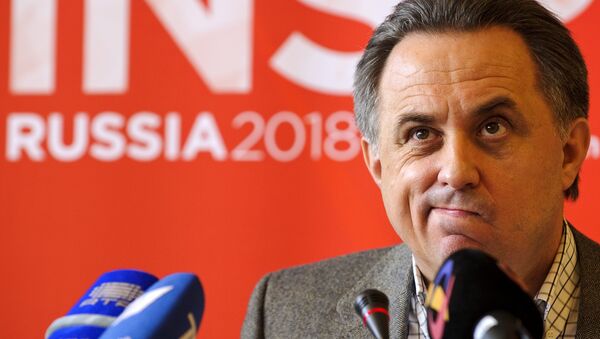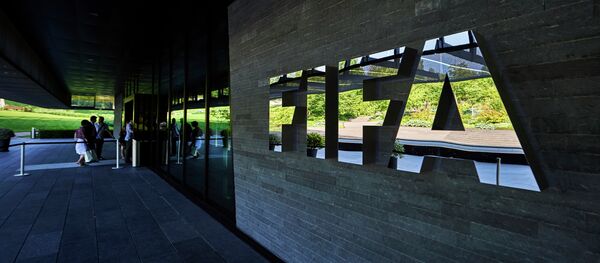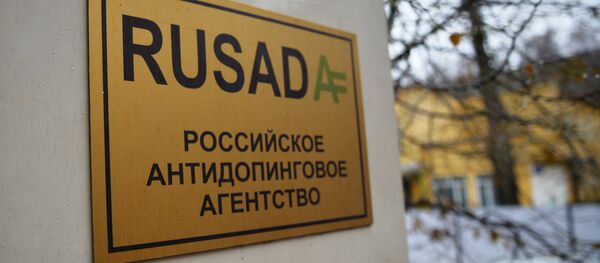MOSCOW (Sputnik), Ivan Kuzevanov — This year lacked Olympic Games or FIFA World Cup, but will be remembered for huge scandals.
No Country for Old Men
Life in the international football governing body had been running its course. In January, four-time FIFA President Joseph Blatter, 78, joined yet another presidential contest expecting an easy victory on May 29.
Also on May 27, seven FIFA officials were arrested in Zurich, Switzerland, on a US warrant on federal corruption charges, including fraud, racketeering and money laundering.
Although no charges were brought against Blatter, two FIFA vice-presidents — Jeffrey Webb and Eugenio Figueredo — were arrested, at the request of US authorities, on corruption charges.
As the corruption scandal erupted, several football officials, including from UEFA, called for the vote to be postponed. FIFA dismissed all calls to postpone the election. Blatter himself vowed to restore trust in FIFA and fix the existing issues.
Despite the scandal, Blatter, who had headed the world footballing body since 1998, was reelected as president for a term until 2019, on May 29. Blatter failed to gain the needed two-thirds majority in the first round, receiving 133 votes, but before the second round, his only rival, FIFA Vice-President for Asia Prince Ali bin Hussein of Jordan, withdrew from the race.
Following the election, Blatter said that FIFA had launched an image-saving campaign after the organization’s major sponsors — Adidas, Coca-Cola, Visa and McDonald’s — voiced concerns over the high-profile corruption scandal that was tainting the reputation of world football’s governing body.
Unexpectedly, just four days after being reelected, Blatter unexpectedly announced his resignation due to the corruption scandal, adding that he was going to remain in office until a new election could be held. The next day, it was reported in the media that the US Federal Bureau of Investigation had launched an investigation into Blatter's activities.
The Kung Is Dead, Long Live the King!
Two months later, FIFA’s executive board named the date for the congress to elect a new FIFA head as February 26, 2016.
Blatter immediately withdrew his candidacy from the election.
"I cannot be the new president because I am the old president," Blatter told journalists following an executive committee meeting in Zurich when officials announced the date of the election.
The FIFA president added that after the resignation he would return to his work as a journalist, taking on a new role in radio.
On July 29, UEFA head Michel Platini, announced his bid for the FIFA presidency, pledging "to work tirelessly for the unity and well-being of world football."
However, in September the Swiss Office of the Attorney General delivered a blow to the French football official's ambitions when it launching a probe into corruption allegations against Blatter over his "disloyal payment" of $2.05 million from FIFA to Platini in 2011 for work allegedly performed in 1999-2002.
According to Platini, the money in question was paid to him by FIFA for his work on the global competition calendar, a FIFA Goal program to support the global football federation and for accompanying Blatter on business trips, although he did not have a written contract.
In October, both Platini and Blatter were temporarily suspended by the FIFA Ethics Committee for a period of 90 days while the investigation was being carried out.
Despite the suspension, Platini registered as a candidate to take part in the presidential election planed for February 2016 along with Prince Ali Bin Hussein of Jordan, Musa Hassan Bility, chairman of the Liberian Football Association, Jerome Champagne, a former French diplomat, Gianni Infantino, general secretary of UEFA, Sheikh Salman bin Ebrahim Khalifa, president of the Asian Football Confederation and Tokyo Sexwale, a South African businessman.
On November 12, FIFA's Ad-hoc Electoral Committee declared five candidates eligible to run for the presidency of the international football organization, promising to consider Platini's candidacy once his suspension expires.
On November 23, the adjudicatory chamber of the FIFA Ethics Committee opened formal adjudicatory proceedings against Blatter and Platini based on the results of the corruption probe against them intending to come to a decision in both cases by the end of the year.
Amphitryon Controversy
Also in May, Switzerland launched a separate probe into the bidding process for the 2018 and 2022 FIFA World Cup tournaments, to be held in Russia and Qatar respectively.
Following the announcement, sources familiar with the situation said that the investigation primarily concerns the Qatar bidding process. In 2010, when Qatar won the privilege of hosting the FIFA World Cup-2022, the announcement created controversy after widespread allegations of corruption and revelations of numerous human rights violations in the country.
However, several US politicians have been trying to capitalize on the anti-Russia speculations. US Senators John McCain and Bob Menendez urged delegates in the run-up to the May presidential election not to reelect Blatter for a fifth term because of his support for Russia hosting the World Cup in 2018.
After his election victory, Blatter stated that the timing of the arrests of senior FIFA officials, just two days before the vote, was "not a coincidence."
"There are signs that do not lie: the Americans were candidates for the World Cup 2022 and they lost," Blatter told the Swiss RTS television channel.
Long after his resignation, in October, the Financial Times published an interview with Blatter in which he revealed the existence of a “gentleman’s agreement” among FIFA leaders, according to which Russia and the United States — “two superpowers” – would hold consecutive World Cups in 2018 and 2022. The arrangement was reportedly foiled after UEFA President Michel Platini voted for Qatar, under pressure from then-French President Nicolas Sarkozy, thereby triggering the FIFA crisis.
The scandal surrounding the choice of countries to host the FIFA World Cup affected not only future tournaments but also sparked retrospective investigations.
In June, The Sunday Times reported, citing a taped conversation, that Morocco had in fact won the right to host the 2010 World Cup but FIFA had rigged the ballot in favor of South Africa.
In October, the German Der Spiegel magazine reported that the 2006 bidding committee had created a special fund of 10.3 million Swiss francs ($10.5 million) to buy the votes of Asian representatives of the FIFA Executive Committee, helping Germany to win the right to host the World Cup in 2006.
Later, former president of the German Football Association (GFA) Theo Zwanziger confirmed that Germany had bribed representatives of the FIFA Executive Committee to gain the right to host the 2006 World Cup.
Faster, Higher, Stronger
The scandal surrounding the All-Russia Athletic Federation (ARAF) began in December 2014, when the German television channel, ARD, aired a documentary in which it was alleged that Russian athletes systematically used performance inhancing drugs. Following the broadcast, the World Anti-Doping Agency (WADA)'s Independent Commission (IC) opened an investigation into the allegations.
On February 3, Russian Minister of Sport Vitaly Mutko said Russia has progressed in preventing violations of doping regulations by professional and amateur athletes much more rapidly than many other nations.
"Russia has always been and always will be the country that conducts a serious and consistent fight against doping. In four years we have done the same amount of work that other countries did over decades,” Mutko told reporters.
Mutko stressed that the percentage of Russian athletes disqualified for violations of anti-doping rules is no higher than the percentage in other countries.
In August, The Sunday Times reported that the International Association of Athletics Federations (IAAF) had used its influence to suppress a survey conducted at the 2011 World Championships in Daegu, South Korea, which revealed that a third of the world’s top athletes admitted to using performance enhancing drugs in the previous 12 months. The IAAF denied the allegations.
On November 4, former IAAF President Lamine Diack and his lawyer were arrested in France as part of an investigation into the use of performance enhancing drugs by Olympic athletes. Diack and his representative Habib Sisse are suspected of accepting bribes from the All-Russia Athletics Federation (ARAF) to conceal doping practices among Russian athletes.
Commenting on Diack's arrest, Mutko stressed that sanctions against the former IAAF chief for allegedly receiving bribes to hide doping practices would not affect Russian athletics.
"This is a criminal proceeding… Someone bribed someone else, what does Russian athletics have to do with this," Mutko told R-Sport news agency.
On November 9, WADA's independent commissions recommended that Russia be suspended from all athletic competitions until the country cleans up its act and complies with the global anti-doping code. The WADA commission report claimed that Russian Sports Minister Vitaly Mutko was aware of numerous cases of doping test being manipulated, and that the Russian Federal Security Service was complicit in the use of performance enhancing drugs by Russian athletes. Mutko has denied the accusations.
The next day, WADA temporarily removed its accreditation of a Moscow anti-doping laboratory following the accusations against Russia of breaching anti-doping regulations.
On November 11, Russian President Vladimir Putin ordered Mutko to conduct an internal investigation into alleged widespread doping practices among Russian athletes.
The same day Mutko stressed that Russia was ready to double-check all the facts and to follow all the WADA recommendations to fight doping problems in sport.
On November 12, the head of an anti-doping laboratory in Lausanne, accused by WADA of destroying blood samples belonging to Russian athletes said the facility had done it according to international regulations and did not have instructions to keep the samples.
On November 14, Russia was provisionally suspended from track and field competitions by the IAAF over the recent doping accusations. Mutko told R-Sport that "there is still a chance for [Russians] to compete in the Olympic games" as the suspension "is temporary, we still need to fulfill a number of requirements in the coming months."
At the same time, the IAAF said it had started to implement a fundamental reform program within the organization after WADA announced on November 16 that IAAF activities might be suspended, and athletics might be excluded from the program of the 2016 Olympics in Rio de Janeiro.
On November 19, the IAAF called on the ARAF to implement "a robust, transparent and efficient" anti-doping testing program as a precondition for lifting its provisional ban on the association, adding that there was no timeframe for a potential lifting of the suspension.
WADA announced that besides Russia, several other countries, including France, Belgium and Spain had been placed on its compliance "watch list."
The next day, IAAF confirmed a temporary suspension of four Russian field-and-track female athletes over suspected violations of anti-doping rules. According to IAAF spokesman Chris Turner, middle-distance runners Kristina Ugarova, Maria Savinova, Yekaterina Poistogova and Anastasia Bazdyreva have been temporarily barred from international competitions.
The ARAF has refused to appeal its suspension by the IAAF, the international athletics body said in a press-release on November 26. The IAAF has promised to come up with a list of criteria to verify the doping compliance of the ARAF before the end of the year.



